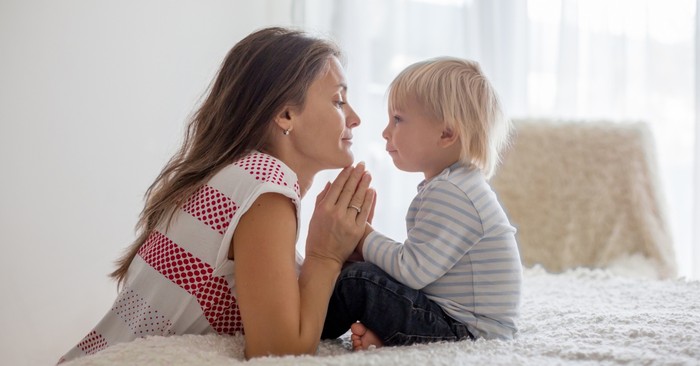
We must move towards the “others” not like us, and fret not about the preoccupations of a striving culture whose ideals shift with the wind. ALL mothers are in need of the truth of the gospel, and all should be invited into the relationship that matters most (with Jesus).
Have you heard? Stay-at-home motherhood is under attack! It's all over YouTube, Facebook, Instagram, and even TikTok—women who are choosing to be home with their children are being targeted as foolish and lazy. They are being bad-mouthed and blamed for unnecessarily bending to the patriarchy's demands and leaving behind their hard-fought rights to have children and a career... or are they?
The premise of this article assumes that stay-at-home moms are attacked. If they are, how so? If they are attacked, they aren’t attacked any more than working moms. What is it that drives us to create or click on articles like this? Let’s explore, instead, why stay-at-home moms (SAHMs) feel attacked. Enter the Mommy Wars.
Reason #1: Culture Can Be Weaponized
We have to acknowledge that the devil, who is constantly seeking to destroy what God loves, will use culture to attack us no matter who we are or what we do. The enemy will use any tool he can to take us down. He may even use a maternal instinct to bring mayhem. In the same heartbeat, we also need to acknowledge that our own flesh will attempt to pull us towards discord, and the world's political powers often use family matters as campaign fodder. Social media has made this more conspicuous, but James addressed the problem in the first century: “What causes quarrels and what causes fights among you? Is it not this, that your passions are at war within you?”
Motherhood is an endeavor that is close to the heart, making passions easily ignitable. When people start sharing their closely held mothering philosophies with others in today’s divisive culture, what works for one person can be perceived as a hostile accusation to another. Jenna Abetz and Julia Moore have attempted to explain:
The mothering ideology that normalizes constant competition between mothers, especially in terms of parenting philosophies, practices, and choices, is termed "combative" mothering. Combative mothering manifests discursively through the metaphor of the mommy wars, which has previously described antagonisms between working and stay-at-home mothers but more recently has shifted to describe animus between myriad parenting philosophies and practices.
To combat our natural passions, the devil, and this assumed contention, we need to look at what the Bible has to say about SAHMs.
Reason #2: Christian Moms Are Not Immune to Disagreeing About What is Best
Not all SAHMs are Christian, but for a Christian, to make a conclusion about whether women should or should not stay home with their children without consulting the biblical view would only promulgate another man-made worldview. The world is already filled with such views. 1 Corinthians 3:18-19 reminds believers, “Let no one deceive himself. If anyone among you thinks that he is wise in this age, let him become a fool that he may become wise. For the wisdom of this world is folly with God.”
Just because something sounds practical or biblical doesn’t mean it is. Before any Christian takes a view on an issue, they must first turn to the Bible for guidance and submit to its truth before bowing to the wisdom of the age. That’s part of following Jesus as Lord. However, some issues are what theologians call adiaphorism, a situation that the Bible does not dictate or restrict.
The Bible does not directly address the issue of whether women should work outside the home when they have children but it does give us this truism: “The wisest of women builds her house, but folly with her own hands tears it down” (Proverbs 14:1 ESV). From this, we gather that a woman should care about her home and household. Later in Proverbs, we see that the exemplary woman described in chapter 31 cares for her home and household, while also carrying wisdom and business savvy into the marketplace.
Titus 2:3-5 tells older women to train the younger women to love their husbands and children and to be busy, or working, at home, and 1 Timothy 5:14 tells young widows to “marry, bear children, manage their households, and give the adversary no occasion for slander.” Clearly from scripture, we see that a woman should be caring about the matters of the household while refraining from laziness or indifference, but there is nothing that forbids a woman from working outside the home. Yet in a world that often exchanges critical thinking for “hot takes” and confirmation bias, a mother is too often asked to take an either/or stance.
Russel Moore suggests that “The angriest debates are not over whether a claim is true, but over what side a person has pledged allegiance to by affirming its truth. Red state or blue state? Cracker Barrel or Whole Foods?” Unfortunately, we pull SAHMs or working moms into this chaos when our allegiance should be with Christ the King above all other things. We too often forget that while the Bible may not clear be clear on the issue of IF a mother should work outside of the home, Paul was clear when he told us, “I appeal to you, brothers, by the name of our Lord Jesus Christ, that all of you agree, and that there be no divisions among you, but that you be united in the same mind and the same judgment.” 1 Corinthians 1:10
Reason #3: Normalization of the Self-ruled Kingdom in Westernized Society
Laying your life down for another is biblical (1 John 3:16), and is also radically counter-cultural. Parenthood comes with a cost, literally and figuratively. And the costs for a mother often outweigh the costs for a father. Amanda Barroso and Juliana Menasce Horowitz reported that in a survey done in October 2020, “roughly eight-in-ten moms (78%) said they did more than their spouse or partner when it came to managing their children’s schedules and activities – and 62% of fathers agreed that their spouse or partner did more in this regard.”
While parenthood also comes with rewards that many would say outweigh the costs, we live in a culture that prioritizes a self-ruled kingdom, where what we do is who we are; the evidence is stunningly clear. Christians should be living for God’s kingdom, but there is an ethos hidden in the so-called “American dream” that the ideal life is one that develops and rules a personal kingdom.
Westernized cultures lead people towards misplaced identity, and it is a prevalent reason SAHMs often feel attacked. If our identity lies primarily in either our mothering or our work, any idea or statement that counteracts what we believe can be perceived as an attack on our deepest, truest self.
Psychologist Henri Tajfel explored this phenomenon when developing the Social Identity Theory. Dr. Saul McLeod summarizes it well:
Tajfel (1979) proposed that the groups (e.g. social class, family, football team etc.) which people belonged to were an important source of pride and self-esteem. Groups give us a sense of social identity: a sense of belonging to the social world.
We divided the world into “them” and “us” based on a process of social categorization (i.e. we put people into social groups).
We want to defend our passions because if we are not fully rooted in the fact that our identity is received from Jesus, we seek to establish and validate it through our choices and actions.
Reason #4: The Polarization Present in Westernized Culture Sets
People have strong convictions about the idea that women should be SAHMs or mothers who work outside the home. When those convictions turn into judgments that morph into slander on blogs, social media channels, or in conversations with friends who believe the same, the issue creates an “us” vs. “them” mentality. This type of mentality is far from the unity God desires for his people.
Jonathan Haidt recently wrote an article entitled Why the Past 10 Years of American Life Have Been Uniquely Stupid, in which he compares our modern-day culture to what unfolded at the Tower of Babel in Genesis 11. He says the biblical tale can act as “a metaphor for what some forms of social media have done to nearly all of the groups and institutions most important to the country’s future—and to us as a people.” The public discourse surrounding the SAHM is often played out on the internet. The amount of angst that emerges from women questioning their own choices and the venom that can come from the promotion of their own agendas should cause Christians to pause and remember the privilege and gift it is to be a mother.
Suggested Solution: Create Community and Heed the Call to Rest
Like it or not, motherhood groups women into a certain category—biologically and socially. If a woman becomes a mother through pregnancy it literally changes her brain. It is a group that should support and build up its members, not be divided into bickering tribes. Mothers need to help, empathize, and encourage one another, but the temptations to tear each other down to make ourselves feel better about our own decisions as a mother are always present. We need not feel attacked simply because someone chooses differently than we did, or fall for the lie that we must repudiate them in justifying our own decisions.
We must move towards the “others” not like us, and fret not about the preoccupations of a striving culture whose ideals shift with the wind. ALL mothers are in need of the truth of the gospel, and all should be invited into the relationship that matters most (with Jesus). For he loves our children more than we do; he can strengthen us when the days are long; he is the one who can meet every need and answer every call. And when we feel attacked for any belief that is biblical or decision we believe God has led us to make, we can rest in the assurance that it is His opinion that matters most.
Photo Credit: ©Getty Images/tatyana_tomsickova








